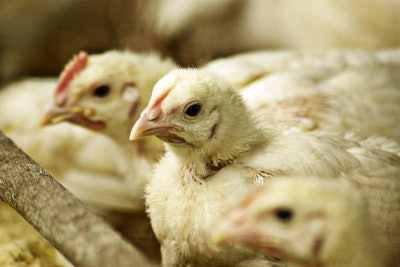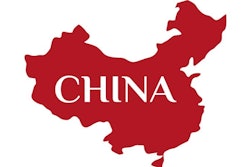
Eventually consumers will be willing to pay the price for higher animal welfare and more sustainable practices, according to an expert panel.
On November 16, WATT Global Media gathered a panel of animal health, animal agriculture and financial professional to discuss major trends shaping the future of poultry and pig production at EuroTier 2016 in Hanover, Germany. The panelists were: Nan-Dirk Mulder, senior global animal protein analyst and associate director at Rabobank International; Dr. Paul Wigley, professor of avian infection and immunity at the University of Liverpool; Dr. Alberto Redondo Cardeña, commercial director at Grupo SADA p.a.S.A.; and Mick Sloyan, strategy directory at AHDB Pork. The event was sponsored by Danisco Animal Nutrition.

Dr. Alberto Redondo Cardeña, commercial director at Grupo SADA p.a., S.A., Paul Wigley, professor of avian infection and immunity at the University of Liverpool, Mick Sloyan, strategy directory at AHDB Pork, and Nan-Dirk Mulder, senior global animal protein analyst and associate director at Rabobank International, participate in a consumer-focused panel discussion at EuroTier 2016 in Hanover, Germany on Wednesday, November 16, 2016. Photo by Terrence O'Keefe.
Along with other topics – including insights into long-term consumer demand and what it means for the industry and technology’s role in sustainable poultry and pig production – the panel tackled the complex issue of animal welfare and sustainability. They said consumer demand, and regulatory pressure, is real and consumers are more willing to pay a premium for products they perceive as being more valuable.
Sloyan, representing organization supporting British pork farmers in the UK, compared the move toward animal welfare in Europe and the United States. In Europe, popular opinion is driving national legislation setting welfare standards while in the US the large retailers are pushing producers to change based on what they see as inexorable changes in consumer preference.
In both cases, the industry is changing and the consumer will have to pay a premium to offset higher production costs. In Europe, Sloyan said, consumers are already choosing to eat less meat. Meat consumption is now flat in Europe and is threating to trend downward in the future. There’s nothing wrong with that, he said, if meat can be sold at a price that reflects the costs of production. The rest of the world will continue to ask for more meat if Europeans do not.
In Sweden and the UK, Sloyan said, consumers are starting to show they are willing to pay a higher price for products they perceive to be more valuable. In western nations consumers can spend more of their income on food, so if consumers continue to pay more for products they value more there is hope for those products.
Cardeña, representing Spain’s largest poultry integrator, said the Spanish economy is down and it’s forcing consumers to change their eating and spending habits. Despite the challenges for the average consumer, Grupo SADA is seeing more consumer interest in specialty, non-conventional chickens. Consumers see those birds as being more flavorful and less industrial than conventionally raised animals. Cardeña said his company is monitoring this trend closely as it represents a future growth opportunity with specialty products.
Wigley, an expert on poultry diseases, said there are trade-offs involved with more sustainable or higher animal welfare products that consumers don’t know about. Consumers are poorly educated on farming and they think that organic, free-range or other products are healthier and therefore more likely to think those products are free of food borne illness.
This belief becomes dangerous, Wigley said, because of practices that call for slaughtering and processing organic and free-range birds before conventional birds. The risk is the animals with higher risk of carrying Salmonella or Campylobacter will spread the disease to the conventional birds and create worse overall health outcomes.
While consumers do consider welfare and sustainability as part of how “healthy” a product is, Wigley said more education is needed to demonstrate how treating sick animals – and not treating sick animals – is an animal welfare issue. Producers must also consider than animals with better welfare are healthier and therefore more productive.


















